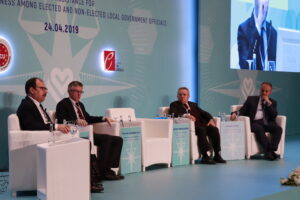
Technical Assistance for Implementation of Civil Society Dialogue and Civil Society Support Programmes (TR2015/DG/01/A5-01/001)
The overall aim of the project is to increase bilateral exchanges and cooperation between CSOs in Turkey and the EU at local, regional and national levels, to promote awareness raising initiatives on importance and benefits of membership of Turkey to the EU within Turkey and EU and on

Technical Assistance for Prevention of Corruption and Promotion of Ethics
Despite the OECD’s assessment that Turkey has made significant progress since 2007 in its efforts to combat corruption, the issue continues to represent an obstacle to economic and social progress and, potentially, to greater integration with the EU. The overall objective of the project was to contribute to

Technical Assistance for the Capacity Building of General Directorate of Highways for the Road Infrastructure Safety Management in Turkey
The project aims to enhance the administrative capacity of the General Directorate of Highways (KGM) to implement road infrastructure safety management and harmonise Turkish legislation with directive 2008/96/EC.

Visibility and Communication for Actions Related to AA/DCFTA Implementation in the Framework of the EU Funded Assistance Programmes
The National Implementation Plan of the EU-Moldova Association Agreement (AA) establishes key priorities to foster political association and economic integration with the EU, including actions assigned to institutions involved in the AA/DCFTA (Deep and Comprehensive Free Trade Area). The DCFTA defines a preferential, mutually advantageous trade relationship between

Technical Assistance for Establishment of MOBİTEK in Kayseri
The project’s overall objective is to increase the productivity and efficiency of the furniture manufacturing of small and medium enterprises (SMEs) in Kayseri and strengthen their product development and marketing capabilities.

Technical Assistance for Promoting Social Inclusion in Densely Roma Populated Areas
It’s an obvious fact that there is a need to increase social inclusion in heavily populated areas, particularly in Rome, mainly by facilitating their entrance into the formal labour market. Within this context, the project aimed to support Rome’s population by improving the quality of education delivery, vocational

